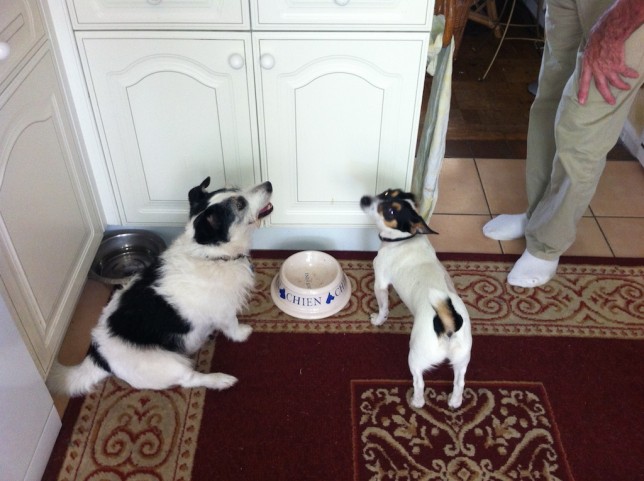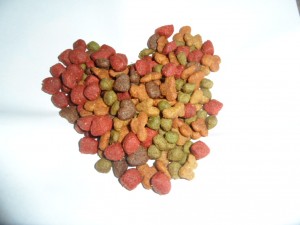The ultimate guide to Jack Russell nutrition
'Macros' and 'micros'
As we all know, dogs are carnivores, and their natural inclination is towards eating meat. However, there's a lot of confusion about what types of food are 'healthy' for dogs.
While dogs and wolves in the wild live in relative satisfaction from a diet of the raw meat and organs of their prey, what's natural isn't always healthy, and what's healthy isn't always natural.
It's helpful to understand food from a nutritional perspective, and to know what role the different types of nutrients play in a Jack Russell's body.
Have you subscribed to my newsletter yet? Just enter your email and click "Sign me up!"
Macronutrients
All food can be split into three different types of nutrient: protein, carbohydrates, and fat. All three are essential in the right balance for dogs as well as humans, since all three perform different roles.
Protein is an umbrella term for the various amino acids that are used by the body to create new cells. Cells are born and die all the time in the body, so we mammals always need protein. Branched chain amino acids (BCAAs), leucine, isoleucine, and valine, are the three most important of these, and determine the 'quality' of the protein source.
Carbohydrates are molecules that the body can use for immediate energy release. These range from simple sugars like dextrose, lactose, and fructose, to complex carbohydrates found in sweet potatoes and carrots.
Fat is also essential for health, because it helps the body break down proteins in the digestive system, and many other essential nutrients such as vitamin A, D, E, and K. It also generally helps to promote healthy cell function.
Not enough or too much of each of these three are both detrimental to a Jack Russell's health, and a healthy balance can normally be achieved through a diet consisting mainly of whole foods. Meat and certain vegetables are your best bet.
I've noticed a lot TV adverts for commercial dog foods that claim to be better for your dog because they contain more 'animal protein'. These premium products are sometimes a waste of money.
I say 'sometimes' because the quality of a protein source is directly proportional to the level of the three main BCAAs: leucine, isoleucine, and valine. Leucine in particular is the important one for mammalian muscle tissue. (It can get way more complicated than this, so make sure to contact me if you're interested in my sources or if you want to learn more.)
The 'quality animal proteins' touted by dog food manufacturers merely contain a string of extra amino acids that offer little to no additional benefit for your dog. However, some dog food brands do offer a good BCAA profile, but the extra price of these is usually much higher than if you were to feed your Jack Russell cooked meats like beef or chicken that are naturally high in leucine.

Micronutrients
A multitude of vitamins are necessary for many of the body's chemical reactions. The fat soluble vitamins A, D, E, and K, all require adequate levels of fat in the diet to be absorbed. B-vitamins are water-soluble, and so is vitamin C. Vitamin C is actually produced in the dog's body but is still helpful in the diet.
Minerals are once again required for the body's chemical reactions, and are needed by the body for structural building. Over-supplementation is just as damaging as 'not enough', and proper amounts are easily found in a diet of whole foods.
Raw meat
While dogs and wolves in the wild eat plenty of raw meat, it's not encouraged to feed your Jack Russell lots of raw meat on a regular basis. The reasoning behind this is that raw muscle tissue and organs can be rife with germs and pathogens if not kept sterile, which can cause serious health issues for your dog.
However, any meat and organs that have been cooked properly are absolutely perfect for a dog's diet, providing him with a great deal of the nutrients he needs. Cooked chicken, turkey, beef, pork, you name it - your Jack Russell will love it.
Vegetables
Vegetables provide a lot of vitamins and starchy carbohydrates that meat and organs don't offer, and our Jack Russell Poppy loves eating them with her tea.
Cooked carrots and mashed potatoes are definitely favourites, both providing great nutritional value without costing a lot of money. However, onions and garlic are definite no-nos.
Commercial dog food
 There are many great commercial dog foods that by themselves will provide your Jack Russell with a lot of the nutrients he needs.
There are many great commercial dog foods that by themselves will provide your Jack Russell with a lot of the nutrients he needs.
When buying dog food, look closely at the packaging to see if it provides a complete and balanced nutritional profile. A mix of macronutrients, vitamins, and minerals is a positive sign.
Dry, wet, and canned dog foods all contain the essential levels of nutrition needed. Try all three and see what your Jack Russell appears to prefer. Wagg's dog food is a best seller, and Amazon is the best value place to buy it.
Stage-of-life dog foods
There are many products out there that claim to be more beneficial for dogs in different stages of their lives. These are a waste of money. What's healthy for a human in his twenties is not significantly less or more healthy for him when he reaches his eighties, and the same applies to dogs.
Treats and obesity
Dogs will generally not refuse any treats you give them, nor will they usually refuse any table scraps or yummy leftovers you have after you've had your tea.
Extreme amounts can obviously lead to obesity in the long term, which is very unhealthy for a Jack Russell. Avoid giving too much of anything calorie-dense or high in carbohydrates.
If your dog is young and highly active, however, treats and leftovers every now and then are fine and shouldn't cause any ill effects. If he's a good boy, give him a lovely dog chocolate every now and then! But try to avoid giving him real chocolate, because it could be dangerous for him.
Regularly assessing your dog's weight and bodyfat levels will show you if your Jack Russell is putting on excess bodyfat. This is easier for short-haired Jack Russells than long-haired ones like our Poppy. You can buy body calipers to track fat on specific parts of the body over time if you want, but these aren't necessary. I don't need a pair of calipers to tell me what I already see.
How much food is too much?
You can track your Jack Russell's weight over time to see if his weight changes significantly, and compare it to his diet. On a day-to-day basis, he'll certainly let you know if he's hungry!
As you get to know your Jack Russell better, it'll become more clear what level of food intake keeps him at a certain weight. We recommend tracking the calories in his diet using this tool - simply type in the food and the amount and it tells you everything you need to know.
Takeaway tips
- All food is made up of different combinations of proteins, carbohydrates, and fats. Your dog needs a balance of all three
- Vitamins and minerals are vital for certain chemical reactions in your dog's body
- The best diet for your dog is a mix of cooked meats, certain vegetables, and commercial dog food
Have you subscribed to my newsletter yet?
Just enter your email and click "Sign me up!"
Related posts:
- Can I feed my Jack Russell chocolate?
- Foods you should NEVER give your Jack Russell
- Why 'stage of life' dog food is a waste of money
- Why does my Jack Russell keep eating grass?
Get Your Free
Jack Russell Advice
Starter Pack
A 7 day dive into Jack Russell behaviour:
- Our free Jack Russell Toolkit ebook
- Subscriber-only access to our 4-lesson Jack Russell Workshop
- Our private Facebook group for Jack Russell Advice
Check out all the bonuses and join 3,000+ people like you
Welcome to the Jack Russell Terrier Advice Centre! We have everything you need to make your life easier as you begin raising your new companion.
